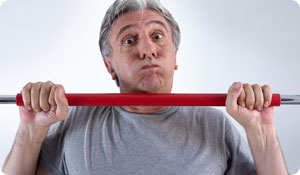
Any exercise is good exercise, but could you be doing better? To find out if your workout is tough enough, ask yourself these five questions:
1. Are you seeing results?
The answer to this question depends on why you exercise.
- Are you just getting started, recovering from illness or just trying to meet your minimum daily exercise requirements? In that case, there's no such thing as a wimpy workout. As long as you try, you're doing fine.
- Are you training for a marathon, working on a six-pack or towards some other athletic goal? If you're consistently seeing improvement in how far you can run, how much weight you can lift and how much muscle definition you see, you're probably doing fine. If you've hit a plateau, however, it's time to switch gears. The key to progress is adding incremental increases in time, distance, weight, elevation, or challenge level until you see the results you want.
- Are you trying to lose weight? If you haven't dropped any pounds lately, it's probably time to work out harder or differently. Mix it up, bump it up or work out longer.
2. Are you sweaty?
If you're not breaking a sweat, you're not working out hard enough. A good cardio workout speeds up your heart and respiratory rates and increases your body temperature enough that you need to sweat to cool off. You don't have to be drenched to achieve good results. A little extra "glow" will do.
3. Are you breathing right?
You should be working hard enough that your respiratory rate is faster than normal and conversation is challenging, but not impossible. You should be able to talk to your workout buddy, but not sing or recite The Gettysburg Address. If you're gulping air and having trouble catching your breath, back off.
If you're a serious athlete in a high-performance level sport, pace your breathing so you don't get dizzy or run out of air before you meet the finish line. Difficulty breathing is a sign you're hitting it too hard.
4. Is your heart pumping?
The ideal target rates for cardiovascular fitness are 50-70 percent of your maximum heart rate for moderate exercise and 70-85 percent for vigorous exercise. If you're not reaching at least 50 percent, work harder.
How do you know what your maximum heart rate is? The simple formula is this: Subtract your age from 220. That's approximately your maximum heart rate.
5. Are you challenged?
If you think your workout is wimpy, you're probably right. Perceived exertion is a fairly good indicator of how hard your workout is.
- If you're tired when you're finished exercising, but not exhausted; you're probably working out at the right level.
- If you never feel physically challenged, you need to walk farther, lift heavier, run faster or swim longer. Or maybe it's time for something new. Keep your brain and body guessing and learning.
If you can work out harder, do it. Be careful not to increase weight, distance, duration or intensity more than 10 percent per week though or you might work yourself into an injury.





